5th International Workshop for Capacity Building in Nematology
Go Back

The 5th International Workshop for Capacity Building in Nematology was jointly organized by the National Nematological Research Centre (NNRC) of the University of Karachi, Karachi, Pakistan Society of Nematologists and ECO Science Foundation (ECOSF) from 12-22 February 2018 at the University of Karachi- Pakistan. The workshop was supported by Higher Education Commission of Pakistan (HEC) and Pakistan Science Foundation (PSF).
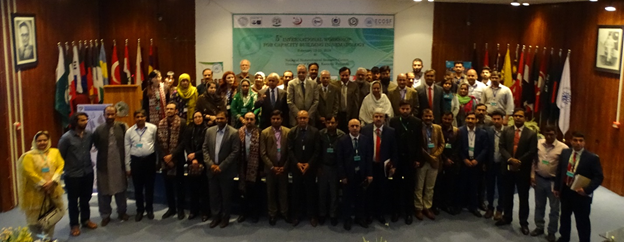
A total of 42 participants which included resource persons and trainees from six ECO countries; i.e. Afghanistan (02), Azerbaijan (01), Iran (03), Kyrgyzstan (02), Pakistan (32- the host) and Tajikistan (02) attended the workshop. The senior scientists presented country reports in one day seminar with reference to status of Nematology and its Development in their countries.
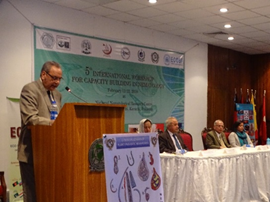 The workshop was opened by the Vice Chancellor of University of Karachi (UoK), Prof. Dr. Muhammad Ajmal Khan and the Member of Higher Education Commission of Pakistan Prof. Dr. G. Raza Bhatti. In his opening speech, Professor Khan welcomed the distinguished national and international guests in the University and thanked ECOSF for partnering with the University to organize the workshop. He pledged his support for the workshop and NNRC for future ventures. He briefly gave introduction of UoK to the participants mentioning its establishment and various programmes/departments. He also shared that some institutes of the University such as Institute of Chemical and Biological Sciences and Institute of Business Administration are the world class institutes. He was admirer of the activities of ECOSF for promotion of Science, Technology & Innovation (STI) in the region. He hoped that ECOSF would continue supporting the University and he would personally look in to the options how the University can benefit more from the Foundation.
The workshop was opened by the Vice Chancellor of University of Karachi (UoK), Prof. Dr. Muhammad Ajmal Khan and the Member of Higher Education Commission of Pakistan Prof. Dr. G. Raza Bhatti. In his opening speech, Professor Khan welcomed the distinguished national and international guests in the University and thanked ECOSF for partnering with the University to organize the workshop. He pledged his support for the workshop and NNRC for future ventures. He briefly gave introduction of UoK to the participants mentioning its establishment and various programmes/departments. He also shared that some institutes of the University such as Institute of Chemical and Biological Sciences and Institute of Business Administration are the world class institutes. He was admirer of the activities of ECOSF for promotion of Science, Technology & Innovation (STI) in the region. He hoped that ECOSF would continue supporting the University and he would personally look in to the options how the University can benefit more from the Foundation.
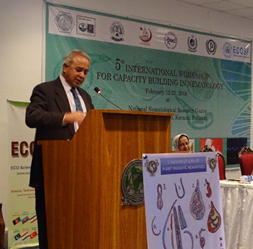 Member (Operations & Planning) of Higher Education Commission of Pakistan (HEC) Prof. Dr. Ghulam Raza Bhatti speaking during the opening ceremony, said that journey of Higher Education Commission of Pakistan was started 15 years back. The success of the commission is the result of enormous uphill struggle. He said that HEC was focusing on the human development and does funding for collaborative and joint research projects and programs. He appreciated the efforts of ECOSF in promoting STI and interaction of S&T community of the 10 ECO member countries and assured of HEC cooperation wherever common goals are being pursued. Professor Bhatti also highly appreciated the National Nematological Research Centre and the Pakistan Society of Nematologists for continuing the efforts in the field of Nematology as well as for publishing Pakistan Journal of Nematology ever since 1983 which is an HEC recognized journal.
Member (Operations & Planning) of Higher Education Commission of Pakistan (HEC) Prof. Dr. Ghulam Raza Bhatti speaking during the opening ceremony, said that journey of Higher Education Commission of Pakistan was started 15 years back. The success of the commission is the result of enormous uphill struggle. He said that HEC was focusing on the human development and does funding for collaborative and joint research projects and programs. He appreciated the efforts of ECOSF in promoting STI and interaction of S&T community of the 10 ECO member countries and assured of HEC cooperation wherever common goals are being pursued. Professor Bhatti also highly appreciated the National Nematological Research Centre and the Pakistan Society of Nematologists for continuing the efforts in the field of Nematology as well as for publishing Pakistan Journal of Nematology ever since 1983 which is an HEC recognized journal.
President ECOSF Prof. Manzoor H. Soomro in his remarks briefly introduced ECOSF and its programmes. He said that the promotion of improved methods in the teaching of science was one of the prime initiatives of ECO Science Foundation. The Foundation focuses on the evaluation of the existing training facilities in the region and formulation of training programmes for building highly skilled scientific and technical human resource. Later, a detailed presentation was made by President ECOSF during one of the technical sessions of the workshop, in which he highlighted the inception and achievements of the Foundation. While describing the main programmes of the Foundation, Prof. Soomro said that critical thinking plays a pivotal role in research and decision making which can be achieved through Inquiry Based Science Education (IBSE) teaching methodology. Realizing its significant potential and impact on the future generation of IBSE methodology, ECOSF in collaboration with La main à la pâte Foundation under the auspices of Academy of Sciences of France, the International Science, Technology and Innovation Center for South–South Cooperation under the auspices of UNESCO (ISTIC) Kuala Lumpur and the Inter-Academy Partnership Science Education Program (IAP SEP) and the Islamic Development Bank is implementing its Capacity Building Program to promote and implement IBSE at schools in the ECO Region.
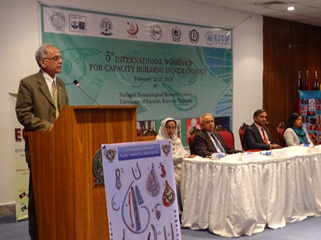 Prof. Soomro added that a curriculum is needed for our kids that enables them to learn morality and social code of conduct in their early age and build profound understanding that all human beings are the same under the skin. Such a curriculum would help to promote global peace and produce the rational citizens with sense of ownership and feeling to live in coexistence and harmony. ECOSF is contributing towards development of school curriculum based on the “Fusion of Civilizations” along the China’s “One Belt One Road” countries in collaboration with Inter Academy Partnership – Science Education Programme (IAP-SEP), the China Association of Children’s Science Instructors (CACSI), Children and Youth Science Center of China Association of Science and Technology- CAST (CYSC) of China Association of Science and Technology (CAST).
Prof. Soomro added that a curriculum is needed for our kids that enables them to learn morality and social code of conduct in their early age and build profound understanding that all human beings are the same under the skin. Such a curriculum would help to promote global peace and produce the rational citizens with sense of ownership and feeling to live in coexistence and harmony. ECOSF is contributing towards development of school curriculum based on the “Fusion of Civilizations” along the China’s “One Belt One Road” countries in collaboration with Inter Academy Partnership – Science Education Programme (IAP-SEP), the China Association of Children’s Science Instructors (CACSI), Children and Youth Science Center of China Association of Science and Technology- CAST (CYSC) of China Association of Science and Technology (CAST).
President ECOSF further said the standardization of engineering qualifications in Central Asia, ECOSF is partnering with UNESCO Federation of Engineering Institutions of Asia and the Pacific (FEIAP) and the Academy of Engineering and Technology of the Developing World (AETDEW) Malaysia.
He also shared with the participants that since its establishment, the ECOSF has established strong working collaborations with international and regional organizations. The Foundation is proud to partner with many of most reputable organizations and development partners, which include the Islamic Development Bank (IDB), International Science, Technology and Innovation Centre for South-South Cooperation under the auspices of UNESCO (ISTIC), Kuala Lumpur, Malaysia; La main a la pate (LAMAP) Foundation, France; European Union; UNESCO, Korea Institute of Science & Technology Evaluation and Planning (KISTEP), International Science and Technology Centre (ISTC), Astana-Kazakhstan, Ev-K2-CNR Foundation- Italy; Turkic World Educational and Scientific Cooperation Organization (TWESCO), Astana, Isfahan Science & Technology Town (ISTT) of Iran, Korea Institute of S&T Evaluation and Planning (KISTEP), Federation of Engineering Institutes of Asia and the Pacific (FIEAP) Malaysia and many other national and international organizations.
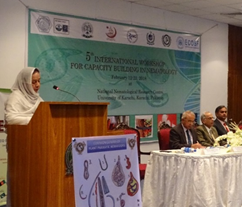 Earlier, Prof. Dr. Shahina Fayaz, Director NNRC formally welcomed all the participants from ECO countries including Pakistan and attendees of the ceremony. While describing the NNRC, Dr Shahina Fayyaz informed that the centre was founded in 1973 in the old buildings barracks of KU while the publication of an internationally reputed Pakistan Journal of Nematology was initiated in 1983 by Dr M.A. Maqbool (Late) and Prof Dr Abdul Ghaffar (Late). So far, more than 1,000 research papers have been published in national and international reputed journals by the centre. The centre has produced 18 PhDs and four MPhils and has close linkages with 50 national and international universities and institutes for joint collaborative research work.
Earlier, Prof. Dr. Shahina Fayaz, Director NNRC formally welcomed all the participants from ECO countries including Pakistan and attendees of the ceremony. While describing the NNRC, Dr Shahina Fayyaz informed that the centre was founded in 1973 in the old buildings barracks of KU while the publication of an internationally reputed Pakistan Journal of Nematology was initiated in 1983 by Dr M.A. Maqbool (Late) and Prof Dr Abdul Ghaffar (Late). So far, more than 1,000 research papers have been published in national and international reputed journals by the centre. The centre has produced 18 PhDs and four MPhils and has close linkages with 50 national and international universities and institutes for joint collaborative research work.
She highlighted the purpose of the workshop and shared:
- To develop capacity in the field of Nematological research and management.
- To identify deficiencies in present methods of dissemination of crop protection information, and opportunities arising from new communication technologies.
- To develop collaboration among ECO member countries in the field of Nematology with focus on crop production.
- To emphasize the importance of phytonematodes problem in the context of current and future global challenges.
The participants were engaged for ten days in different activities and following topics were covered through presentations and hands-on activities:

- Introduction to Nematology.
- Importance of Nematodes as quarantine pests in growing trade (National perspective)
- Survey, field observation, Collection, storage Techniques for Extraction, isolation of nematodes
- Symptoms and disease caused by plant parasitic nematodes
- Survey, Collection and sieving of soil and root samples
- Morphology and major groups of Plant Parasitic Nematodes
- Status of root- knot nematodes
- Quantitative and Qualitative analysis of:
- Extraction of Plant Parasitic Nematodes,
- Handling, processing, fixation of nematodes,
- Temporary mounting of nematodes
- Cyst Nematode isolation and identification up-to species level
- Enhancement of nematode resistance by feeding site specific expression of defense related genes in plants
- Extraction of vermiform (male and Juveniles) and Cyst nematodes
- Killing, fixing and processing of nematodes
- Permanent Slide mounts for male and juvenile
- Vulval cone of cyst nematodes
- Light microscopy of eelworm and cyst nematodes
- Measurements and Drawings
- Life cycle
- Embryonic and Postembryonic developmental stages
- Strategies used by nematodes to parasitize plants and transgenic approaches to develop nematode resistance
- Extraction of Root Knot Nematodes, Morphology of vermiform (male and Juveniles) and root knot nematodes, Preparation of perineal pattern for identification of Meloidogyne species, Staining of Meloidogyne egg-masses, Maintenance of root-knot nematode culture and Root-knot Index (RKI)
- Biological Control by EPN in Iran
- Extraction of entomopathogenic nematode (EPN) by Soil Trap method, White Trap method for extraction of infective juveniles, Dissection of Galleria mellonella larvae for life cycle of EPN, Processing of various stages of entomopathogenic nematode, Transverse section cutting for identification of juveniles, Mounting of Permanent slides, Camera Lucida for line drawing of nematodes and Photomicroscopy
- Extraction of Virus vector nematodes, Processing of nematodes, Permanent slide mounting, Morphometrical and Morphological observations and Line Drawing of virus vector nematode.
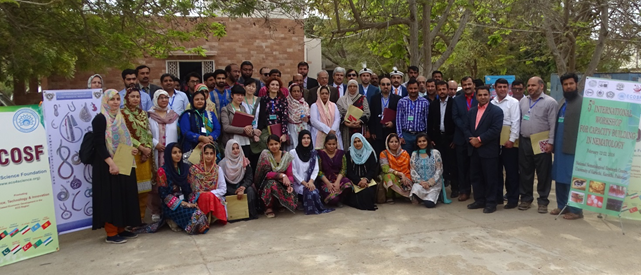
On the final day, a concluding ceremony was arranged and the shields and certificates were distributed among the resource persons, trainees and supporting staff by President ECOSF who was the Chief Guest of the ceremony.